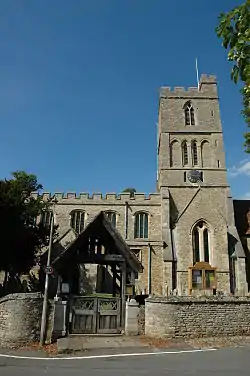John de Burnham
John de Burnham (died 1363) was an English-born judge and Crown official who spent much of his career in Ireland. He held office as Lord High Treasurer of Ireland and Chief Baron of the Irish Exchequer. He spent many years trying to clear himself of charges of corruption, which seem to have been the invention of malicious colleagues.
Early life
He was a native of Norfolk, and was probably born in one of the group of adjacent villages which are called the Burnhams.[1] He became parish priest of Felmersham, Bedfordshire in 1333 and was named as a tax assessor for the same county in 1340.[2] He was a member of the Royal Household from the 1320s onwards, and gained great experience in the field of finance, especially of army accounts.[3]
 Church of St Mary, Felmersham, Bedfordshire: Burnham was the parish priest here in the 1330s.
Church of St Mary, Felmersham, Bedfordshire: Burnham was the parish priest here in the 1330s.
Lord Treasurer of Ireland
In 1343 he was sent to Ireland as Lord Treasurer;[4] he also became a canon of St. Patrick's Cathedral, Dublin and a prebendary of Cloyne.[5] His appointment as Tresurer was apparently connected with complaints by the Privy Council of Ireland about the efficiency of the Irish Exchequer, and the Council's doubts about the honesty of Burnham's predecessor Hugh de Burgh.[6] It was no doubt thought that Burnham, with his long experience of administering the English royal finances, would be a reforming Treasurer; but it is difficult to determine what, if anything, he achieved, and his long battle to clear himself of charges of corruption can hardly have made the task of reforming the Irish Exchequer any easier.
Charges of corruption
In 1348 he was summoned to England to answer very serious charges as to his record as Treasurer, involving accusations of fraud, negligence and concealment of the royal revenues for his own profit. His stay in England lasted for seven years, requiring him to appoint attorneys to manage his Irish affairs.[7] The charges appear to have been instigated by William de Barton,[8] a disgruntled official in the Exchequer of Ireland with a personal grudge against Burnham. Barton belonged to a rival faction in the Dublin administration, and played a large part in the subsequent inquiry. There is no evidence that Burnham was regarded by the rest of his colleagues as corrupt.
In the end Burnham was cleared of any wrongdoing. While the accusations against him were numerous and detailed, Connolly[9] concludes that there is no credible evidence to support any of them, and that the charges were fabricated by Burnham's rival William de Barton. Although Barton, given the lack of evidence to support them, could not really hope to prove the charges, he could hope that the length and complexity of the inquiry, which he himself dragged out as far as possible, would cause Burnham a great deal of time and trouble.[10]
Last years
Having vindicated his good name, Burnham returned to Ireland to take up the office of Lord Chief Baron in 1355. He remained in office until his death in 1363.[11] He and his former enemy William de Barton appear to have resolved their differences, and they worked amicably together in the Court of Exchequer for several years.[12]
References
- Ball, F. Elrington The Judges in Ireland 1221-1921 John Murray London 1926 Vol.1 p.81
- Ball p.81
- Connolly, Philomena The Proceedings against John de Burnham, Tresurer of Ireland 1343-9 in "Essays Presented to J.F. Lydon" Cambridge University Press 1993 p.57
- Patent Rolls Edward III Vol.6 p.3
- Ball p.81
- Connolly p.57
- Patent Rolls Edward III Vol.10 p,82
- Connolly p.58
- Connolly p.58
- Connolly p.71
- Ball p.81
- Connolly p.65